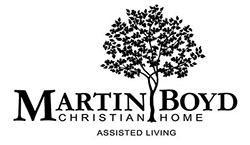Dementia is a growing concern for many seniors, with Alzheimer’s disease being the most common cause. Over 5 million Americans are living with Alzheimer’s, and that number is expected to triple in the coming decades. As the senior population grows, so too will the prevalence of dementia.
The cognitive, behavioral, and functional impacts of dementia present many challenges for seniors and their loved ones. The hallmark symptom of dementia is memory loss, particularly short-term memory issues that disrupt daily life. Individuals may forget recent conversations, events, names, faces, or appointments as confusion and disorientation become common.
You may be thinking: Who can I turn to when it becomes too difficult to manage my loved one at home? At a memory care community like Martin Boyd Christian Home, our goal is to minimize these difficulties and enhance quality of life through comprehensive support services. Let’s look at some of the ways memory care communities help you during this challenging life stage.
Create a Safe Environment
Creating a safe living environment is crucial for supporting individuals with dementia and Alzheimer’s disease. At Martin Boyd Christian Home, we aim to reduce hazards and confusion by simplifying living spaces.
We remove unnecessary clutter and rearrange furniture to open up rooms so residents can walk around easily. We also install grab bars, railings, and adequate lighting in hallways, bedrooms, and bathrooms to reduce the risk of falls. We put up calendars, clocks, and signs to help orient residents to the date, time, and location. These environmental cues can help reduce disorientation.
By modifying the physical environment, we allow residents with dementia to navigate their living space with greater confidence, independence, and comfort. A safe environment minimizes stress and confusion.
Encourage Physical Activity
Regular physical activity is incredibly beneficial for those with dementia and Alzheimer’s disease. Exercise improves overall health, reduces anxiety and depression, improves sleep, and enhances cognitive function. Some of the best exercises for dementia patients include walking, swimming, and chair aerobics. These low-impact activities improve strength, balance, and coordination.
Having fitness classes tailored to the residents’ abilities is a great way to motivate regular exercise.
Walking groups allow social interaction with others at a similar fitness level. Group exercise classes should focus on range of motion, strength training, and light aerobic activity to benefit dementia patients.
It’s important to always provide supervision and assist residents as needed during any physical activities. With an appropriate exercise program, those with dementia can experience reduced behavioral issues, improved mood, and slowed cognitive decline.
Provide Cognitive Stimulation
Keeping the mind active is a key part of managing dementia. Martin Boyd Christian Home provides regular cognitive stimulation through a variety of engaging activities.
Games, puzzles, arts and crafts, and music therapy are excellent ways to exercise the brain. We incorporate many of these activities into our daily programming. Puzzles like jigsaws and crosswords, as well as card and board games, provide mental challenge. Arts and crafts projects tap into creativity and fine motor skills. Singing and listening to music utilizes multiple areas of the brain.
Providing one-on-one interactions is another simple but effective cognitive stimulation technique. Our caregivers engage residents in conversations during activities and routines. This personal engagement challenges the mind through expression, listening comprehension, and cognitive exercises woven naturally into discussion. Additionally, recalling and sharing stories from the past not only exercises the mind but also boosts mood.
Utilize Support Groups
Support groups can provide many benefits for both dementia patients and their caregivers. By participating in support groups, patients and caregivers can connect with others going through similar experiences. This helps reduce feelings of isolation and validates the challenges they face.
In a support group setting, participants have the opportunity to share their personal experiences and the coping strategies they’ve found helpful. Hearing how others handle the day-to-day difficulties of dementia can provide new ideas and encouragement. Support group members often exchange practical tips and information on resources available.
For caregivers especially, support groups allow them to voice their frustrations and struggles in a judgement-free atmosphere. Other group members can empathize and reassure caregivers that they are not alone. Support groups remind caregivers to take care of themselves as well, which is vital for their own health and wellbeing. Martin Boyd can recommend memory care support groups in the area.
Dementia Care Techniques
At Martin Boyd Christian Home, we train our caregivers on the latest evidence-based techniques for caring for individuals with dementia and Alzheimer’s. This includes learning how to:
– Approach situations with empathy, patience and understanding
– Use validation therapy and reminiscence techniques
– Simplify tasks and instructions into manageable steps
– Create routines to provide structure and consistency
– Use calm, positive communication and redirection
– Apply person-centered care principles
Managing Challenging Behaviors
Caring for someone with dementia can sometimes lead to behaviors like aggression, wandering or sundowning. We provide specialized training to help caregivers understand the causes behind behaviors and learn strategies to compassionately and safely respond to them. This includes proactive approaches to prevent triggers as well as reactive techniques to de-escalate situations.
Conclusion
Making life meaningful for those living with dementia is a multifaceted endeavor that requires a thoughtful and comprehensive approach. By focusing on creating a safe environment, encouraging physical activity, providing cognitive stimulation, and utilizing support groups, we can significantly improve the quality of life for individuals with dementia.
Are you ready to talk about memory care for your loved one? Martin Boyd has dementia care specialists ready to talk with you. Contact us today.

